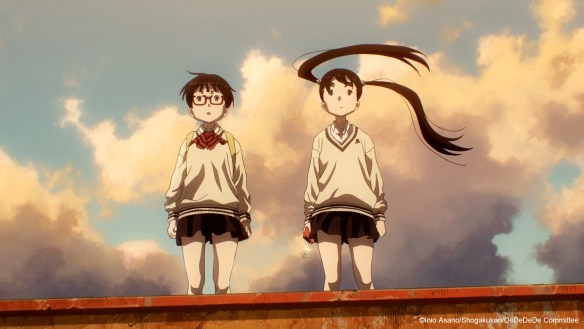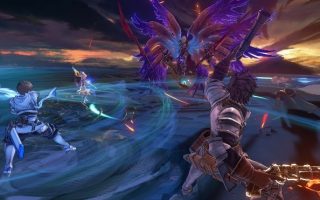Hello folks, and welcome to the end of another year on this swiftly decaying orb. There’s no sugarcoating it; this has been a year of absolute horrors on the global stage, with my own government doing its best to sanitize a ruthless genocide while the world at large slips further into regressive, reactionary social attitudes and outright fascism. The neoliberal consensus of the early 2010s has broken on the back of capitalism’s increasingly ruthless post-COVID exploitation, and the best message the alleged adults in the room could muster was “things are fine the way they are,” a message that resonated so poorly it sent a narcissistic, buffoonish reality show host back into the most powerful seat in the world.
It’s tough to feel optimistic at such times, to believe that things might be better six or twelve months from now. There’s no denying that we’ve got some difficult times ahead of us, but hey, it’s not like the last few years were any sort of picnic, and we got through them with the same tricks that’ll get us through this one. Whatever this world attempts to take from us, we still have our capacity to find wonder in its many miracles, we still have the pledges we make to each other, and we still have great art to inform, inspire, and bring us together. If there’s any collective lesson to be taken from my favorite new anime of the past year, it is this: that even, perhaps especially as the world verges on apocalypse, we must hold close to our loved ones all the more tightly, take comfort in the stories we love, and build communities one shared meal or simple phone call at a time.
Personally, this has been a year of both upheaval and continuation. I was fortunate enough not to experience any catastrophe so disruptive as last year’s house fire, though given I spent ten years at the old apartment, I’d still consider myself settling into this new one. It’s been harder and harder to find freelance writing work in the increasingly consolidated internet, and the demise of Twitter has also burned down a platform I spent ten years building, but I try not to dwell on things that are entirely beyond my control. And as for what I can control, I’m proud to say that I have entirely caught up on Wrong Every Time’s outstanding reader bounties, having at last completed even my ponderous, embarrassingly confessional Neon Genesis Evangelion essays. I know having such supportive readers puts me in an enviable position relative to most writers, and my proudest victory of the year is to be doing right by them, and critiquing the hell out of so many diverse and compelling properties.
It certainly helps that you all have such audacious, intelligent, and refined taste in art. Seriously though, we’ve been churning through some wonderful works this year, from insta-fave classics like Galaxy Express 999 and Dear Brother to recent stars like Hugtto! and Frieren, alongside a generous apportioning of further-flung projects like Rebels of the Neon God, Goodbye, Eri, and the ferocious documentary Twenty Years Later. The works we’ve charted have opened my eyes to new ranges of personal expression, and I can only hope that I’ve done a decent enough job as fellow traveler, making my joy at discovering such wonders tangible to all of you. I know I am absurdly lucky to be able to dedicate so much time and energy purely to celebrating the richness and poignancy of art; all I can say in thanks is that I’m grateful to all of you, that my love of storytelling only seems to increase by the year, and that if you plan to stick around, I’ll do everything I can to become even more deranged and obsessive about stories in the year to come.
Anyway, that’s more than enough navel-gazing regarding my own journey through the year. Let’s get to the real reason for the season: my top anime of the year, be they actually from this year or not!
Dead Dead Demons DeDeDeDe Destruction
You can gauge the collective fears of an era through the sort of art that era produces; the threat of nuclear annihilation that inspired Godzilla and Dr. Strangelove, the end-of-history ennui of Fight Club and The Matrix, etcetera. In our current era, stories are often suffused with a fundamental hopelessness, a sense that things are bad and won’t get better that informs such trends as the off-to-fantasyland isekai exodus. And no one catalogs that hopelessness more sharply, or illustrates both its causes and consequences with more acuity, than Inio Asano. In Dead Dead Demons, the end of the world is a given, an inevitability only railed against by those too old to recognize the decline. What is truly important is what we do with the time we have remaining, and Asano’s articulation of that stretch across two dozen or so shiftless teens, working professionals, and alien invaders reveals both the diffuse causes of societal collapse and the selfish, vital humanity we embody in spite of it. Touching on concerns ranging from the soul-numbing reality of social media to the sanitization of genocide, Asano offers an album of vacation photos from the brink of apocalypse, an urgent work that feels oddly comforting in its hopelessness. We’re probably not gonna make it, but at least we’re not gonna make it together.
Look Back
There are times when it can feel pointless to seek any profound meaning in art, when the mundane expectations of the world bear down so heavily that creative passion feels more like a curse than a gift, when the heavy succession of thankless days or errant cruelty of fortune makes one wish they didn’t dream at all, that their brain wasn’t broken in just such a way as to see miracles in manga, to find hope in the anguish of the artist. Look Back is a testament scrawled in blood, sweat, and tears for all such floundering seekers, a gorgeous, scrappy synthesis of genius mangaka and essential director, a statement of solidarity and monument to all the days spent huddled over a desk, willing a line or word or note to join with its brothers and become something magical, something greater than the labor that conjured it. In a world that’s feeling increasingly harsh and isolating for all of us, and where creative expression is largely mediated by producer or algorithm, Look Back is a reminder of how powerful art can be, how personal, how sharp-edged and transformative, as well as an assurance that all such beauty emerges from the same old seemingly thankless grind. In both form and thematic intent, Look Back is the defiant pro-art statement of the year.
Monogatari Off Season
As most long-time Monogatari aficionados know, the series is often at its best when its ostensible protagonist Araragi is absent, and the show’s many other rich characters can express their stories unfiltered by Araragi’s distinct perspective. As such, the outright conclusion of Araragi’s story has actually been something of a boon for the ensuing seasons, as Nadeko’s frantic journey through this Off Season well demonstrates. Off Season sees the franchise returning to the rich, playful visual vocabulary of its early years, exploring the contradictory necessity of personal transformation and constancy of identity that plague our would-be mangaka, here realized through the actual revival of Nadeko’s various past selves. It is a kindly story that begs us to forgive our youthful indiscretions, and embrace the idea that we are always works in progress as a source of hope, not a cause for condemnation. Nisio Isin remains the king of anime psychological drama, and Off Season casually reasserts his right to the throne.
Delicious in Dungeon
I have a somewhat tempestuous relationship with Studio Trigger. Their aesthetically holistic, wildly expressive approach to animation sets them as the truest successors to my beloved Gainax style, but their visual talents often feel squandered on juvenile narrative fantasies. This sets them up as a studio in desperate need of worthy source material, and Ryoko Kui’s Delicious in Dungeon is worthy indeed. An ostensibly RPG-derivative dungeon crawl that actually dives deep into the fantastical ecology of the underground, Delicious in Dungeon reminds us that we are all just as much a part of our own ecosystem, and that it is up to us to nurture our world or abandon it at our peril. Mixing thoughtful worldbuilding with charmingly off-kilter characters and regular action spectacle, Delicious in Dungeon is simply an excellent, ever-engaging drama, the kind of show you can and should recommend to everyone.
Sound! Euphonium Season 3
The halls of Kitauji are haunted by ghosts in Sound! Euphonium’s third season, covering Kumiko’s third and final year in their concert band. With so many of our heroine’s memories of this place tethered to her absent seniors, their presence is felt in every empty hallway, every covered archway, every step towards that familiar yet mercurial practice room. Kumiko in her third year is bound to the past yet anxious for the future, as things that once felt eternal slip beyond her grasp, all while she tries her best to project certainty as the club’s president. It is a season of nostalgia and anxiety, compromise and hope, and Kyoto Animation capture every discordant fragment of Kumiko’s path with characteristic grace. Is a concert band more than its component members? What is the value of passion in vain? And finally, inescapably, what the hell am I going to do with my life? It’s been a privilege to share this journey with Kumiko all these years, and a joy to see her receive such a generous sendoff.
Sailor Moon
With my housemate away for a month this August, I decided it was past time to monopolize the living room for some high octane cartoon watching, and at last sweep through the entirety of the original Sailor Moon. And in a life defined by regrettable decisions, this certainly was not one of them; Sailor Moon is an absolute treasure, boasting a preposterously charming leading cast and one of the greatest production teams ever assembled. On the bones of the franchise’s accommodating narrative template, legends like Junichi Sato and Kunihiko Ikuhara assembled a carnival of wonders, where every fresh episode brims with playful animation and endearing character moments. The show is both enthralling artistic spectacle and unapologetic comfort food, one of those lightning-in-a-bottle convergences of talent and material that change the medium with their crackling glow.
Night on the Galactic Road
The story of Giovanni and his quiet friend Campanella has taken on a life of its own, with stories like the mournful scorpion or the very image of a train crossing the cosmos recurring throughout anime. In watching this film adaptation, it is not hard to see why. Giovanni’s adventures ramble and weave like an inescapable yet half-remembered dream, sticking in memory, their beautiful images and ominous details dancing merrily with any suitably primed imagination. The film is generous yet inviting, offering implied volumes of mystical labor and discovery, while leaving such broad gaps between its details that the mind is forced to conjure their own histories and explanations for the fisher of the stars, or the shadow-men laboring beneath a dead city. That particular image might call to mind Angel’s Egg, and it’s a fitting comparison; both are meditations on grief in their own way, and both offer only the answers that their viewers bring to them. A somber and wondrous film.
Galaxy Express 999
Given how much I enjoyed Night on the Galactic Railroad, I suppose it’s little surprise that I’m loving its most direct animated successor, Leiji Matsumoto’s Galaxy Express. And indeed, what Matsumoto’s story takes from Galactic Railroad is all to the good, and representative of an era where animated stories could dream more broadly and lure more ambiguously, where protagonists could be small, overwhelmed boys in worlds defined by forces they freely admit are beyond their understanding. But in its wandering parables regarding human nature and technology, Galaxy Express offers more than just a surreal travelogue; it stabs right at the heart of our self-defeating ambitions, our belief that we can somehow dig ourselves out of our bespoiled, atomized lives with the very weapons of capital and science that created them. Furious, mournful, and brimming with imagination.
Trigun
Piece by piece, I am continuously filling in the outstanding gaps in my anime education, and finding more to enjoy than I’d ever expected. Trigun definitely qualifies as a surprise to me, given my vague but generally negative recollections of it from my adolescent Adult Swim-viewing days. Returning this year, I discovered a production that deftly marries shonen convention to moral melancholy, setting itself the unenviable task of offering satisfying episodic action spectacles in spite of a protagonist who refuses to raise a gun in anger. Vash the Stampede’s pacifism offers both abundant mechanical complexity (how do we solve this scenario peacefully?) and just a sprinkling of philosophical inquiry, while Satoshi Nishimura’s production luxuriates in the dust and grime offered by the last era of traditional cel photography. Traditional structures executed with imagination and precision are a worthy enterprise, and Trigun is shonen manga adaptation done right.
Mai Mai Miracle
So yes, it would appear I am a fan of Sunao Katabuchi. Both his In This Corner of the World and Princess Arete stand among my favorite anime films, and I can now attest that Mai Mai Miracle rests proudly beside them. Adapted from Nobuko Takagi’s autobiography, the film has a rhythm all of its own, winding with the temporal fickleness of childhood itself as Katabuchi recounts the friendship of the tale-telling Shinko and her new friend Kiko. As with all of Katabuchi’s works, nothing here is overstated, yet everything is pregnant with intent; the loss of Kiko’s mother and onset of adolescence both hang over these girls, but for the moment, they play and build dams and talk of old princesses, marveling at how single summer days can feel endless while entire eras pass in a flash. A meditative, precise, and above all deeply human story.
Mobile Suit Gundam
Yes, I know I also listed Gundam as one of my year-end entries last year, but did you know there is a lot of Gundam? Even just sticking within the Tomino-directed properties, the original 0079 is buttressed by a generous selection of similarly impressive sequels. In our modern era of one-and-done single season adaptations, it is hard to imagine episodic storytelling on the scale of 0079, Zeta, and ZZ, the ways these stories sculpt reluctant heroes and ramshackle communities among the chaos of war, and the brutality with which those communities meet their end. The meta journey of seeking a solution to mankind’s constant bloodshed, to the inevitability of each new victor becoming the next era’s tyrant, is a tale told in hundreds of episodic strokes, an epic novel culminating in the simultaneous cry of hope and defeat that is Char’s Counterattack. Only Tomino’s era could allow for such a grand tapestry of yearning and violence; only Tomino himself would choose to end it with such bitter finality, knowing we will never escape the misfortune of our birth.
And with that, I believe we’ve covered at least a demonstrative cross section of my year in anime. I hope your own 2024s have been similarly fruitful, and more importantly that you find some peace and comfort in the year to come, while doing your best to be that comfort to others when you get the chance. All we have is each other, but that might just be enough – and in the meantime, watch a weird movie, go out to a show, or put on something you’ve always wondered about but somehow never explored. The world is full of wonders yet, if we’ve strength enough to seek them.
This article was made possible by reader support. Thank you all for all that you do.




